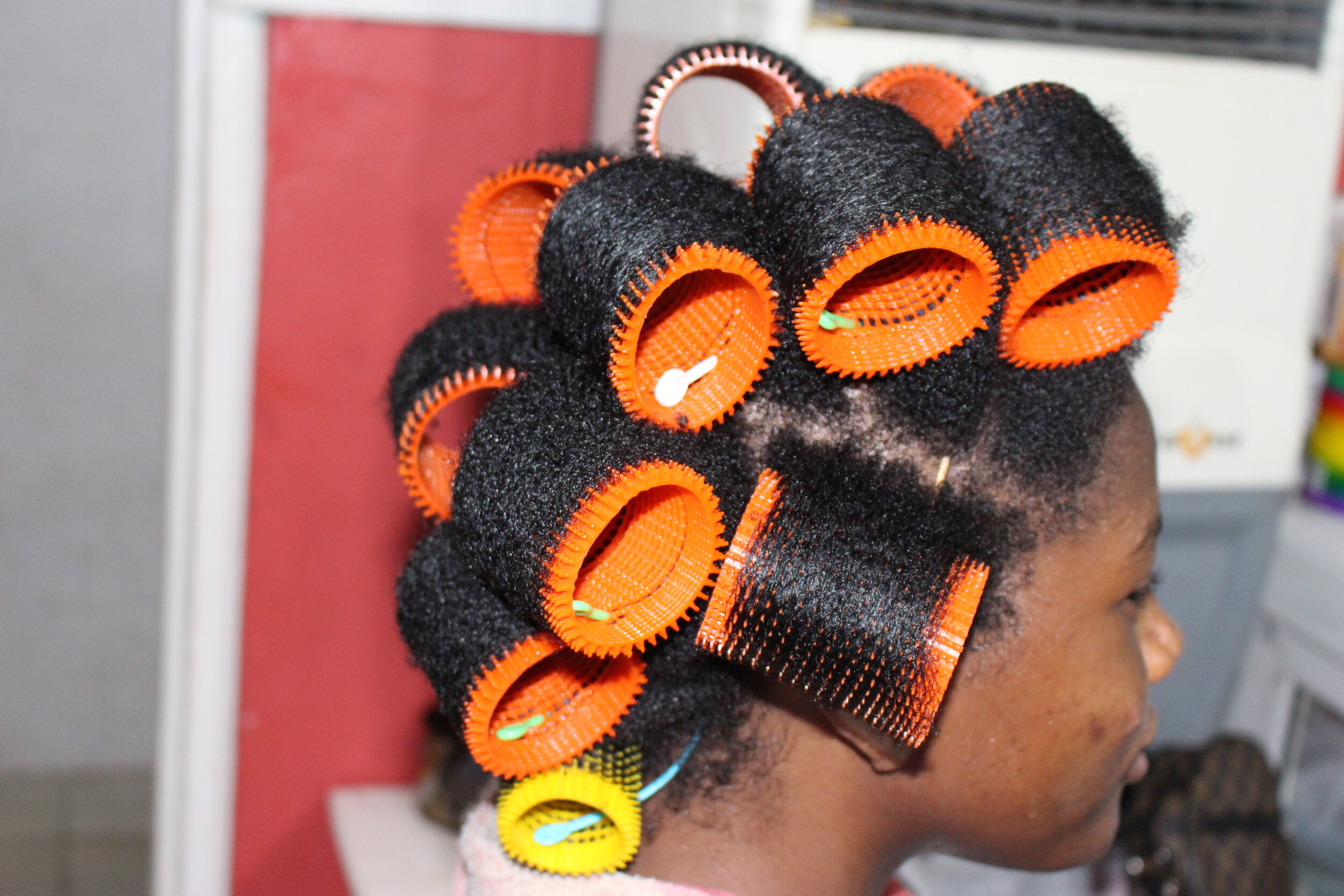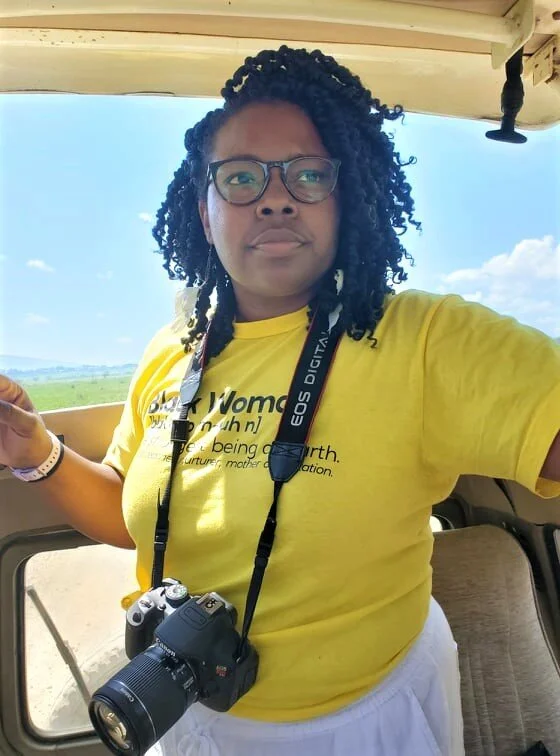Where did the Magic go?: Natural Hair is “Hard” Hair in Ghana
As an African American woman, I’ve had my own natural hair journey in the U.S. But I also started a different hair journey in Ghana when I first visited in 2009. In 2010 I had my first and last relaxer in a salon in Ghana. (I would continue to relax my hair until I was 31) On many of my additional visits to Ghana I had my hair either cornrowed, braided or twisted with extensions— we all know how economical (for us) hair braiding is on the continent in comparison to the U.S. It was in 2018 however, after a daily glimpse at women with sister locs walking by, a style I knew to be undesired and associated with crime and drugs in Ghana, that I started to look at Black hair in Black spaces differently. My desire to conduct research on hair stories in Ghana began in that visit, but the research had already begun since my first trip, and my many sessions in their salon chairs. And now, as Ghanaian women were embracing their natural hair, unlike when I first arrived and was surprised that I only saw relaxed styles and braids with extensions, I wanted to know what was different?
My outsider, but insider, lens has been a unique one as I moved through spaces in Ghana. Such spaces have included the multiple hair salons I’ve visited throughout my numerous trips over 12 years. And yet, it was only on my recent 2021 trip that I finally experienced a hair salon where I felt true care was taken when doing my hair. My natural unprocessed hair.
This blog is a space for the African women and men who wish to share their own hair narratives. A platform for voices often unheard and for narratives that have always existed but have not yet been cultivated.
In Ghana, I have learned that African textured hair is either soft or hard. Hard, as women often state “my hair is hard, and it’s too difficult to manage,” is what they do not want. I’ve been told by hair dressers in Ghana that my hair is soft. It is an awkward experience as they love on my hair, in a way that makes me a bit sad. I’ve also been told by several ladies that “Black American hair is soft”—as if all of ours is and that theirs could never be. But little do they know, in the United States, my hair is considered hard, not soft— if we define it by desirability. But I have never called my hair hard, nor even have I associated it with being hard to manage— but I recognize that I have been lucky to have grown up being able to play with my hair, learn to care for my hair, and I never desired to be anything else but Black, despite the white society impacting me, and my hair is a part of that blackness. Yes, I had relaxers most of my youth due to no choice of my own, but what I hope we all embrace, is that our hair is magic. Whatever we desire to do with it, is our choice. One thing we all desire, no matter which hairstyle is on our crown, is for it to be healthy and loved— and that’s magic. And as I have experimented with my natural tresses over my adult years, I realize that it is not quite coarse, it may be soft, but my hair is not plenty. This is my hair, and I do not dare define it as nappy. Now at times it will be a bit unruly, but a bit of water and conditioner, and whew… magic.
This is my hair, and I do not dare define it as nappy. Now at times it will be a bit unruly, but a bit of water and conditioner, and whew… magic.
Black hair is so magical. We can do so many things with it, it is a canvas asking to be made up. Our African roots have shown us that we’ve always adorned our heads with our hair as crowns. Our crowns are sacred and hold a heritage all their own. But for so long, a lot of that heritage and history of African hair has been removed from our self understanding. But as we always have seen, of our African descended peoples, attacks from the oppressor only make us re-imagine and reconstitute our culture— Black hair is no different.
In the U.S. Black women’s hair has created a space of empowerment through embracing our hair roots, and all the ways that our hair allows us to make it beautiful. We’ve embraced playing with our hair, learning how it works, making our own hair care products and routines, and sharing for all the sisters in need. This sharing is global. And in the past decade or so, we have seen women on the continent, and men, embracing African hair’s roots in ways similar to how we see it on U.S. Black women and men.
Black hair is so magical. We can do so many things with it, it is a canvas asking to be made up.
But I’ve felt at times, that the magic is missing in Ghana. African hair is magic, and some of my Ghanaian sisters are not as privy to this amazement like I have been blessed to watch and experience myself. I do not simply define the magic of our hair as it being whatever we need it to be. I also define the magic as what reminds us that to have such a crown is beautiful and priceless, and we are the only racialized group with such a texture and thus such magic. I mean the magic that makes us love our hair no matter which state it is in. The magic that let’s us look in the mirror at a week old twist-out and know that with just a bit of care, some time, and creativity the magic will be visible again. Do not get me wrong, from my initial data gathering, Ghanaians love their African hair, but unfortunately what I’ve noticed with those I’ve interviewed is that many do not love their own individual crowns. And this is not of their own fault.
Growing up in the U.S. and being trained in Black Studies and counseling, I understand how the roots of white supremacy make us wonder and worry about which hair is “good” and which hair is “bad” or in Ghanaian speak, which is “soft” and which is “hard.” One of the main reasons I wanted to ask questions about Black hair in Black spaces was the absence of a white dominant society. What are their hair stories? Do they struggle like we struggle— Black people with Black hair in white spaces?
Thus far, the stories I’ve collected have similarities to our own, variables differ and yet, still at the foundation resides white supremacy through the continued effects of colonialism. I cannot wait to share my findings. Let me back up a bit… I cannot wait to find the time to analyze my data to actualize my findings. But here, in this blog, I will not be the one writing the majority of the contributions.
This blog is a space for the African women and men who wish to share their own hair narratives. A platform for voices often unheard and for narratives that have always existed but have not yet been cultivated. So join me, Dr. LaToya (as my African friends tend to call me), as I continue in my African Hair Stories research project, with a public scholarship approach to engaging with my work. I have collected over 200 surveys in Ghana which I will analyze in due time, and I have collected individual interviews in both Ghana and Kenya that also will be analyzed as I work towards academic publication and presentations. But here, on this website, I will share a small docuseries with the voices from women and men in Ghana, and this blog with guest authors sharing their own narratives. We have voices from Ghana, Kenya, Zanzibar and South Africa lined up. Are you an African born and raised on the continent interested in sharing a part of your hair story? Reach out. Perhaps AHS is the space for you.
Welcome to African Hair Stories (AHS). Thank you for reading. And thank you for seeing the complexities and politics of Black hair.






Passion twists done by Lola salon in Accra. Most gentle hair salon I have experienced in Ghana.















